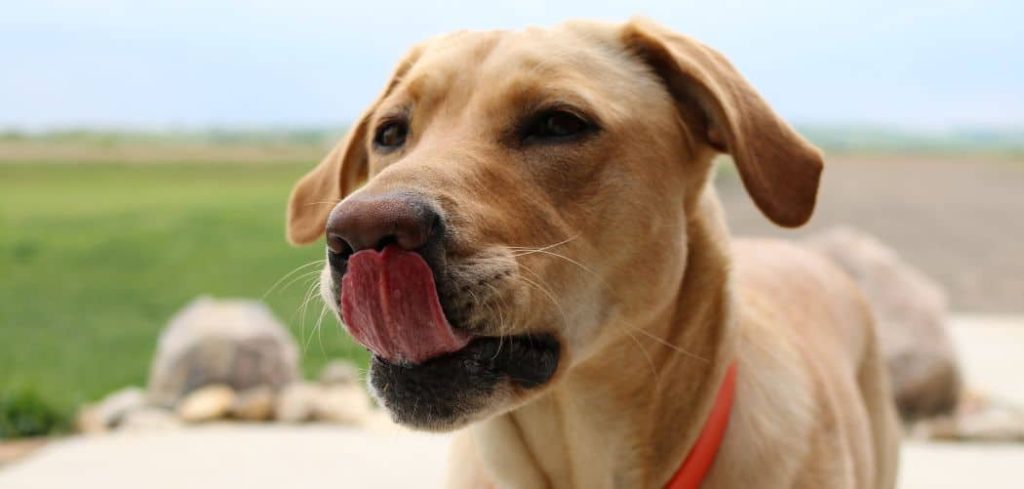It can be worrying to see a dog suddenly licking their nose excessively, especially if it seems out of character or starts without warning.
While some nose licking can be perfectly normal, an abrupt increase may signal irritation or an underlying health issue.
We outline the common causes of sudden excessive nose licking in dogs, what you can do at home, and when to seek veterinary help.
Dog Licking Nose Excessively Suddenly — Why It Happens
When a dog suddenly begins licking their nose excessively, it is often a response to discomfort, irritation, or stress. This behavior can be linked to nasal irritation from allergies, a foreign object lodged in the nose, or infections affecting the sinuses.
It may also be associated with nausea, dental problems, or neurological conditions that affect swallowing and facial movement.
In some cases, dogs may lick their nose due to stress or anxiety, using the behavior as a self-soothing mechanism.

Sudden Excessive Nose licking in Dogs: Common Causes
Allergies
Allergies are one of the most common reasons a dog may suddenly start licking its nose. Pollen, dust, mold, or even food sensitivities can trigger nasal irritation, causing a dog to lick in an effort to relieve discomfort.
Dogs with allergies may also sneeze, have watery eyes, or develop itchy skin. Excessive nose licking in this context is the body’s way of trying to soothe irritation or clear allergens from the nasal passages.
If allergies persist, they can lower your dog’s quality of life and make them more susceptible to secondary infections.
Read more: Dog Licking Everything Excessively Suddenly (What it could mean)
Foreign Object in the Nose
A sudden onset of nose licking can indicate that something is stuck in your dog’s nasal passage. Grass seeds, dirt, or small debris can cause intense irritation, prompting repeated licking and sneezing.
If a foreign body is present, dogs may paw at their face, sneeze forcefully, or show sudden discomfort. Left untreated, the object may cause swelling, infection, or even obstruct breathing, making this a serious situation requiring veterinary care.
Nasal Infection
Bacterial or fungal infections affecting the nasal passages can cause inflammation and discomfort, leading a dog to lick their nose frequently. Such infections may arise after an upper respiratory illness or exposure to contaminated environments.
In addition to licking, nasal infections can produce nasal discharge (clear, yellow, or green), foul odor, or noisy breathing. These infections often worsen without treatment and may spread deeper into the sinuses, making early detection and veterinary care essential.
Nausea
When a dog feels nauseous, one of the first subtle signs may be excessive licking of the nose or lips. This behavior helps them manage excess saliva and can precede vomiting.
Causes of nausea include dietary indiscretion, gastrointestinal illness, or even motion sickness.
A dog that licks their nose excessively and suddenly may soon display drooling, restlessness, or retching, all pointing toward stomach upset or more serious underlying issues.
Dental Problems
Oral health issues such as gum disease, abscessed teeth, or oral injuries can also trigger excessive nose licking. Pain or irritation in the mouth can cause dogs to lick their nose as a way of coping with discomfort.
You may also notice bad breath, difficulty chewing, or pawing at the mouth. Left untreated, dental infections can spread, affecting overall health and making early intervention critical.
Neurological Conditions
Although less common, sudden excessive nose licking may be linked to neurological problems.
Seizures, focal seizures, or conditions affecting the facial nerves can cause unusual repetitive behaviors like nose licking.
In these cases, the licking may be accompanied by disorientation, twitching, or sudden changes in behavior. Neurological causes are often serious and require immediate veterinary evaluation.
What to Do If Your Dog Is Suddenly Nose Licking Excessively
If you notice your dog suddenly licking their nose excessively, start by observing their overall behavior. Look for other signs like sneezing, nasal discharge, drooling, vomiting, or pawing at the face. This can help narrow down the cause.
At home, you can gently wipe your dog’s nose with a clean, damp cloth to remove irritants. Ensuring your dog has access to fresh water helps keep them hydrated and comfortable.
If allergies are suspected, limiting exposure to common triggers like pollen or dust can help. For dogs with mild nausea, offering a bland diet may provide relief.
However, if the licking persists or worsens, a veterinary visit is strongly recommended. Sudden and excessive behaviors are often signs of discomfort that shouldn’t be ignored.
When to Call or Visit Your Vet
Seek veterinary care immediately if your dog’s nose licking is accompanied by difficulty breathing, persistent sneezing, nasal discharge, or signs of pain. These may point to infection, obstruction, or other serious conditions.
If your dog vomits repeatedly, shows disorientation, or has a sudden change in behavior alongside the nose licking, call your vet right away. These can be signs of gastrointestinal or neurological issues that require prompt attention.
Even if symptoms seem mild, a sudden change in behavior like excessive nose licking warrants a checkup. It’s always better to rule out serious causes early.
Read more: Dog Sneezing and Licking Nose (When to be concerned)
Key Takeaway
A dog licking its nose excessively and suddenly is often reacting to discomfort, irritation, or illness.
While mild and short-lived cases may resolve on their own, persistent or severe licking can point to underlying problems such as allergies, infections, foreign bodies, or even neurological conditions.
Observing additional symptoms and seeking timely veterinary advice ensures your dog gets the care they need.
Trust your instincts—if something feels unusual about your dog’s behavior, a professional evaluation is always the safest step.
